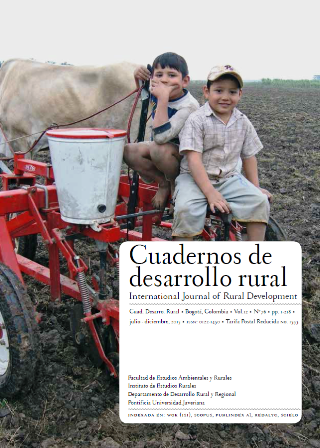Abstract
This study addresses the marginal economic value of environmental amenities, structural characteristics, neighborhood facilities, and accessibility on property in Aquitania - Colombia. Based on 400 assessed values of rural land property and on 21 characteristic variables of land amenities and facilities, the study compares three models: Ordinary Least Squares (ols), Spatial Lag Model (slm), and Spatial Error Model (sem). Results show that both slm and sem outperformed ols in identifying the significance of real estate attributes. Results shows that farmers value environmental amenities more than other attributes, being implicit the greater value of cattle over agriculture (onion) in land use. These models may help to support decisions in rural real estate economics.Cuadernos de Desarrollo Ruralis registered under a Creative Commons Attribution 4.0 International Public License. Thus, this work may be reproduced, distributed, and publicly shared in digital format, as long as the names of the authors and Pontificia Universidad Javeriana are acknowledged. Others are allowed to quote, adapt, transform, auto-archive, republish, and create based on this material, for any purpose (even commercial ones), provided the authorship is duly acknowledged, a link to the original work is provided, and it is specified if changes have been made. Pontificia Universidad Javeriana does not hold the rights of published works and the authors are solely responsible for the contents of their works; they keep the moral, intellectual, privacy, and publicity rights.
Approving the intervention of the work (review, copy-editing, translation, layout) and the following outreach, are granted through an use license and not through an assignment of rights. This means the journal and Pontificia Universidad Javeriana cannot be held responsible for any ethical malpractice by the authors. As a consequence of the protection granted by the use license, the journal is not required to publish recantations or modify information already published, unless the errata stems from the editorial management process. Publishing contents in this journal does not generate royalties for contributors.


